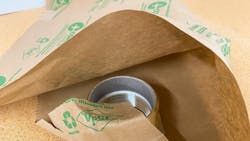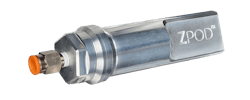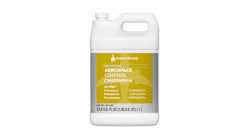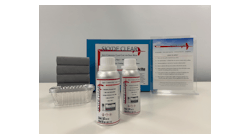Corrosion Prevention
In the business of creating environmentally responsible corrosion solutions since 1977, Cortec Corporation pioneered a new generation of vapor (phase) corrosion inhibitor (VCI) technology. (The technology was based primarily on amine carboxylates as a safer alternative to earlier DICHANs widely used by the military after WWII). Today Cortec continues to look for more sustainable technologies to add to its extensive corrosion protection product line, said Technical Sales and Product Manager Eric Uutala.
Corrosion is caused when moisture and contaminants react with metal surfaces. Looking specifically at VCI technology, its ionic action creates a molecular layer that inhibits rust by keeping out oxygen, moisture and other corrosive elements.
Trademarked under the name VpCI, Cortec VpCI products come in multiple forms: packaging, “emitters,” films, liquid rust preventives and more.
According to Cortec, the benefits of VpCI are:
- Multi-phase VpCls can be more economical than conventional oil-based rust preventatives.
- Efficient application results in labor savings.
- VpCIs offer improved health, safety and pollution control characteristics in many cases.
- There is usually no need to remove the VpCI protection layer, eliminating extra processing steps.
- VpCI treatments virtually eliminate economic loss due to rust, speckling, staining, and other forms of corrosion, cutting rust claims and returns while improving product quality.
The company points out that many Cortec VpCls do not contain chromates or other heavy metals, nitrites or chlorinated hydrocarbons.
Corrosion can be a major problem for idle equipment and assets, especially in the presence of moist, salt-laden air or fluctuating humidity that forms condensation on electrical systems, rotating equipment, hydraulics, bolts, valves and motors, for example. For older aircraft, exposure to extreme moisture and harsh environments increases the chance for corrosion.
During the COVID-19 pandemic, Cortec promoted the preservation of commercial jets and helicopters and presented a buyer’s guide of VpCI products that could be used to wash external surfaces of an aircraft, treat a fuel system, spray electronic systems and articulating joints, and lubricate bearings, to name a few. Cortec’s website offers specific product model recommendations and more details. Here are a few examples.
VCI-coated papers can be used to wrap aircraft parts. VCI molecules in the paper coating vaporize and condense in a protective molecular layer on the surfaces of metal enclosed inside the VCI packaging paper. When components are removed from the paper, the VCI molecules naturally float away from the metal, leaving behind a dry and ready-to-use surface.
Heat sealable translucent plastic films can be used to protect sizable aircraft components, and even shrink wrap entire jets and helicopters. Depending on film thickness and application conditions, VpCI Shrink Film can protect a wide variety of metals from rust, tarnish, stains, white rust and oxidation for up to 5 years. VpCI-126 does not contain free amines, phosphates, or halogen-based materials. Cortec even has a program for eligible recycling partners to send their used VpCI-126 Film back to Cortec extrusion plants for reprocessing into new material.
VpCI Emitters (available in a variety of forms including pouches, pieces of foam, tape and cups) allow VpCI molecules to be emitted through a membrane (such as breathable Tyvek) and are ideal for enclosed void spaces, such as packages, equipment internals or structural metal cavities. Emitter cups, like the VpCI-105, are designed to provide corrosion protection for metal components and parts enclosed in non-ventilated cabinets or toolboxes up to 5 cubic feet. VpCI Emitters are chosen based on the size of the enclosure.
Cortec invites aircraft maintenance personnel to reach out for assistance with specific corrosion problems, especially in the area of preservation. As Uutala, commented, "Cortec has extensive experience with preservation of aviation equipment worldwide, from spare parts to complete aircraft. We understand all the challenges in this industry and are ready to help."






